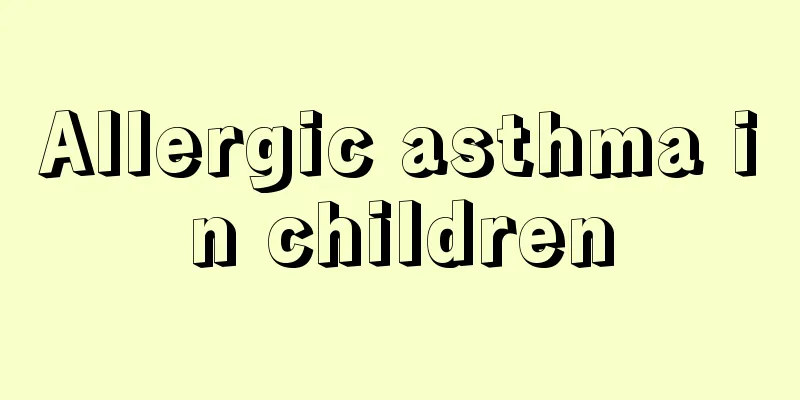After the beginning of autumn, keep an eye on your baby and beware of five diseases

|
The beginning of autumn has just passed, and although the temperature is still high, don’t forget that autumn is about to come again. Before autumn really arrives, mothers cannot slack off in taking care of their babies. It can be said that they have to prepare for the change of seasons in advance. In autumn, babies can easily be affected by colds, diarrhea, and bronchitis due to the hot weather. Mothers should keep an eye on their babies and beware of these three diseases.
Disease No. 1: Autumn cold Autumn is the season when influenza viruses are prevalent. Babies have low body resistance and are easily attacked by influenza germs. Some babies often catch colds, fevers, coughs and asthma after the fall, and the symptoms recur repeatedly. As autumn approaches, mothers should still start by strengthening their baby's physique, increasing his disease resistance and reducing the number of illnesses. Dressing for the cold autumn As the temperature begins to drop gradually in autumn, mothers don't have to rush to add clothes to their babies. "Cover up in spring and keep warm in autumn" means letting your baby feel the appropriate cool stimulation, which helps to train his cold resistance. When the seasons just start to change, the temperature is still unstable and the summer heat has not yet subsided. If you add too many clothes too early, once the temperature rises, you will sweat and be exposed to the wind, which is easy to catch a cold. So it is best to let your baby wear clothes of the same thickness as you. If you don’t feel cold when sitting still, he won’t feel cold either. Keep ventilation and dry bedding frequently Keeping the indoor air fresh is very good for your baby's health. On sunny days, drying your baby's bedding in the sun can not only disinfect and remove odors, but also make your baby more comfortable. Disease No. 2: Autumn diarrhea Autumn is the peak season for baby diarrhea, which is usually caused by rotavirus and often occurs in autumn and winter. Because the local immunity and digestive system of infants and young children are not fully developed, they are easily infected with rotavirus and develop diarrhea. When the disease occurs, most babies will have some symptoms of respiratory infections such as colds, such as runny nose, fever, etc. Some babies also have vomiting symptoms. When a baby has diarrhea, his stool is like water or egg drop soup, and most of the time it has no special fishy smell. It can happen up to a dozen times a day. Don't take antibiotics blindly Since autumn diarrhea is caused by rotavirus infection, taking antibiotics will not only be ineffective, but will also disrupt the growth of normal intestinal flora. In addition, after the baby suffers from autumn diarrhea, he cannot take adult antidiarrheal drugs, which is very dangerous for the baby. It is recommended to consult a doctor for the treatment of autumn diarrhea and use intestinal mucosal protectants and probiotic preparations. Adjust your diet The usual treatment for autumn diarrhea is mainly to adjust the diet. As long as there is no severe vomiting, most babies do not need to fast. During diarrhea, babies are prone to secondary lactose intolerance, which prolongs the duration of diarrhea. If necessary, it is necessary to temporarily replace the lactose-free infant formula. After the diarrhea improves, normal formula milk and breastfeeding can be resumed. Babies with severe vomiting need to fast for 4 to 6 hours before gradually increasing their feeding. Disease number three: tracheitis The high incidence of tracheitis in autumn is usually caused by viral infection of the upper respiratory tract. The weather in autumn is complex and changeable. If the baby's body temperature changes too quickly, inhaling irritants such as smoke, pollen, wool, etc. may cause bronchial infection in the baby. The main symptoms of tracheitis in babies are loud crying and wheezing. When the baby is irritable, the cough will intensify and the wheezing will become louder. Give your baby plenty of water Children with tracheitis have varying degrees of fever and a large amount of water evaporation, so you should pay attention to feeding your baby more water. The diet is mainly semi-liquid to increase the water content in the body and meet the body's needs. Turn your baby over and pat his back When the baby coughs and expectorates, it indicates that the secretions in the bronchial tubes have increased. In order to promote the smooth discharge of secretions, nebulizer inhalation can be used to help expectorate, 2-3 times a day, each time for 5-20 minutes. If it is an infant, in addition to patting the back, you should also help the baby turn over once every 1-2 hours, so that the baby remains in a semi-recumbent position to facilitate the discharge of phlegm. Disease No. 4: Rhinitis When the autumn wind blows, babies sneeze constantly. This is because the large temperature changes in autumn lead to an increase in dust and sand in the air. The baby's immune mechanism is still imperfect and the resistance is weak, which can easily cause rhinitis in the baby. The main symptoms of rhinitis in babies are continuous sneezing, itchy nose, nasal congestion, and clear nasal discharge, which may be accompanied by headaches. If not controlled in time, it may also induce complications such as sinusitis, adenoids, otitis media, pharyngitis, bronchitis, bronchial asthma, and persistent headaches. Avoid exposing your baby to allergens Allergens such as dust, mites, and fungi can easily cause rhinitis in babies. Pay attention to regular indoor ventilation and keep the home clean. For example, in home decoration, reduce the use of curtains and carpets, and do not use down pillows, down quilts and Simmons mattresses. Don't let your baby get close to pets such as cats, dogs, and crows. During the pollen spreading season, don't take your baby to places with lush flowers, plants, and trees, and don't pick or smell flowers and plants at will. Drink plenty of water and juice to soften nasal secretions. Reduce the blockage of respiratory secretions. If the secretion is excessive, you can use hot water or steam to fumigate the nose. Disease No. 5: Allergic dermatitis The amount of animal dander, various pollens, and dust in the air increases greatly in autumn. Babies' resistance to allergies is still weak, and they are prone to allergic dermatitis. The main symptoms are dryness, redness and peeling of the skin on the cheeks, which then extend to the face, neck, wrists, hands, abdomen and limbs. When the baby is ill, prevent him from scratching the itchy area to avoid breaking the skin and causing infection. Prevent dust mites and mold As babies spend more time indoors in autumn, it becomes more important to prevent dust mites and mold. It is recommended that mothers wash the covers of various bedding with hot water above 70°C every week to control the growth of dust mites and mold. At the same time, avoid using carpets, stuffed furniture, and giving your baby stuffed toys. Clean up the dead corners of your home Keep the indoor environment clean and clean up dead corners, especially hot and humid places, such as bathrooms and basements. Mothers can use dehumidifiers and air filters and replace the filters regularly to reduce exposure to mold and pollen; air conditioner filters also need to be cleaned frequently. |
<<: What to do if children have otitis media
>>: What causes cerebral palsy in children?
Recommend
One year old baby's O-shaped legs
For a one-year-old baby, it is the stage of learn...
The impact of a father's bad temper on his children
Many parents hope that their children will have a...
Diet therapy for recurrent cough in children
Recurrent coughing in children is a common diseas...
What medicine should children take for urethritis
Urethritis is a common clinical disease. The inci...
Injections to boost lung function in premature infants
For premature babies, the respiratory system is n...
Reasons why children have difficulty breathing when sleeping at night
Even when the child is sleeping, if the child has...
A brief discussion on the latest height and weight standards for 4-year-old babies
The human body's various organs, appearance, ...
Is it dangerous for a three-year-old baby to have a fever and convulsions?
Our babies will often encounter many problems on ...
My six-month-old baby always cries when he sleeps at night
A six-month-old baby is in a critical period of g...
Symptoms of cold in newborns
As the weather gets colder, parents will put on t...
How to treat vasodilation in children
Vascular dilation in young children is actually a...
What are the symptoms of hemolysis in babies?
When a newborn baby shows symptoms of jaundice an...
Four month old baby's eyes
During the baby's development process, the ba...
What is the cause of the pain in the child's penis?
Genital health is a very important matter, especi...
At what age is it best for children to start brushing their teeth?
Everyone wants to have white teeth, so have you b...









